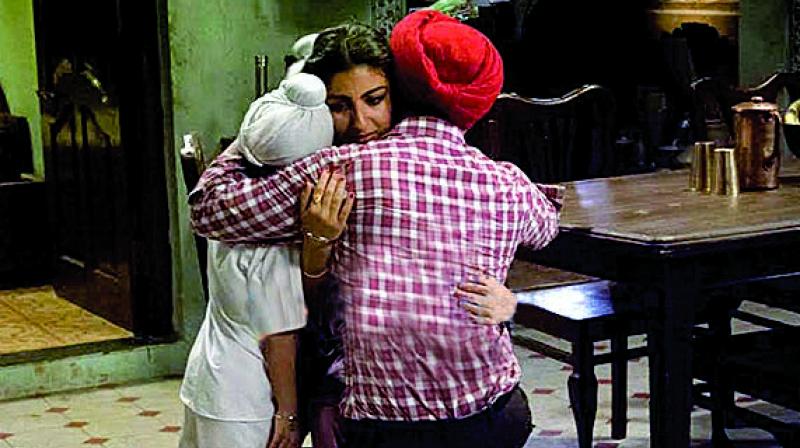31st October movie review: Goldmine of an idea goes waste!
PM Mrs Gandhi gets ready to start her day at her Safdarjung residence in New Delhi.

Director: Shivaji Lotan Patil
Cast: Soha Ali Khan, Vir Das, Lakha Lakhwinder Singh, Pritam Kagne.
The brutality of a political assassination is always dreadful, and could result in severely inhuman ramifications for many decades to come. Art, thus, in any form, must chronicle such disasters for posterity. But while recounting the horrors of such targeted killings one needs to exercise utmost care. And caution.
A half-baked tale against the backdrop of any tragic history can turn even more heartless if it fails to do justice to what, where and why of what motivated such a heinous killing. Based on former Indian Prime Minister Indira Gandhi’s assassination in 1984, and written by Harry Sachdeva, 31st October is a grim reminder of the shocking incident that continues to shame us while the repercussions are still felt by some.
National Award winning Marathi filmmaker Shivaji Lotan Patil deserves a pat for conceiving a film on the subject. Alas, even after distancing us (it’s been 30 years since) from the killing of such an important political figure that further impacted the lives of thousands of lives, and led to communal anti-Sikh riots, the film doesn’t narrate anything new. Or something that we are not aware of.
The film opens with the fateful day of October 31, 1984, with shots of the common man going about the daily grind on a weekday in Janakpuri in the capital. Nothing ominous hangs in the wintry air as school children rush to catch their school bus, office goers get ready, and men begin preparations of the rituals at gurdwaras.
In another part of the city, another Sikh, Davinder Singh (Vir Das), an employee of the Delhi Electricity Supply Undertaking (DESU), escorts his two sons to their school bus while stopping to pay his respects at the gurdwara. His wife (Soha Ali Khan), a homemaker, goes through her daily grind of cooking and managing her home. Other citizens too, are busy with their mundane quotidian jobs.
Not many miles away in the same city, PM Mrs Gandhi gets ready to start her day at her Safdarjung residence in New Delhi. At 9.20 am, as she steps out and walks through the garden of her residence, a trusted Sikh bodyguard pulls out a .38 revolver and shoots her point-blank. Another bodyguard, also a Sikh, then takes out an automatic weapon and shoots 30 rounds into her body.
Over the course of the next few hours the lives of each of these people turns upside down as everyone attempts to pick up the pieces of a broken society. Within minutes violence escalates, as friends turn foes; love gives way to hatred; innocent Sikhs are killed ruthlessly, and the city is engulfed in flames as anti-Sikh riots ignite leaving thousands dead. Shops, homes and public places get vandalised, but any wreckage doesn’t enrage men and women nearly as much as the fact that they are bitterly betrayed by the neighbours and friends.
Though it reflects not so oft-told tale, one expected Sachdeva to establish strong humanistic and deeply personal qualities of the perpetrators. Since the tragedy took place not many years ago, almost every bit of the incident shown in the film has been known to us.
As a film, 31st October should have served to encourage a sobering sense of responsibility, a more truthful perspective on our identities — both individual and national — and a stronger tendency toward restraint in those who might find violence appealing. And justifying. There was a goldmine of rich material here, but there is nothing explored of the dark subject matter in this story. Neither is any attempt made to go beyond what is already in public domain, and so, the film fatally lacks in focus or momentum. In terms of the background to such an unfortunate incident, the director doesn’t furnish us with any more insights, whatsoever, to give us a peep into the cause for such an attack. This could have been a revelatory work on the nature and consequences of physical, emotional, psychological and sexual violence too. Instead, all that the narrative focuses on are gory killings that make viewers bruised by depictions of gross violence. Even after so much bloodshed shown, the discomforting exploration of human misbehaviour fails to strike a chord among the viewers: so devoid of any emotional connect the film remains.
Among the cast, Das doesn’t comprehend the complexities of playing a hapless victim’s role. He is a stand-up comedian and should stick to comic acts; Ali, too, looks helpless in a Sardarni’s character with no dimensions.

